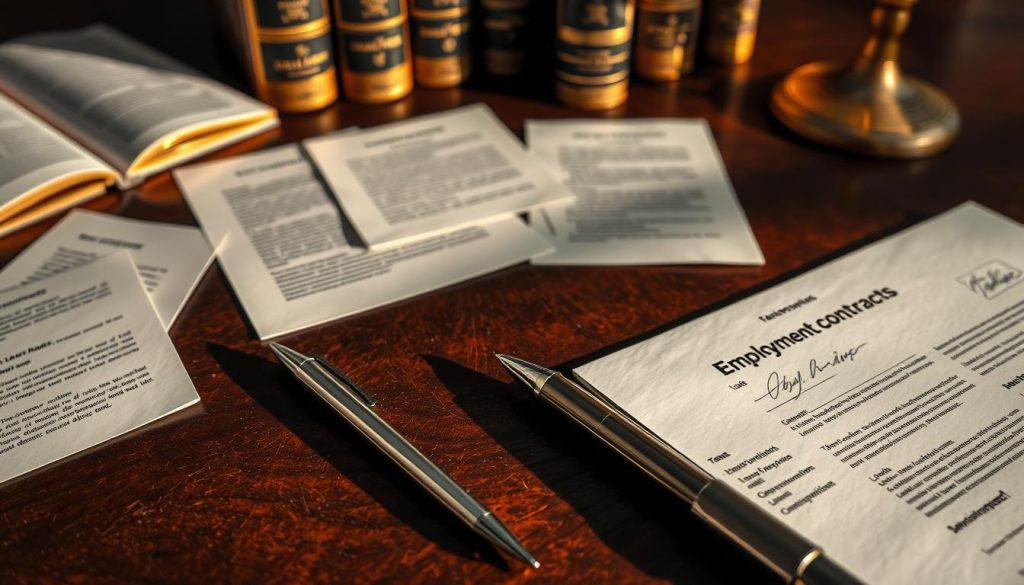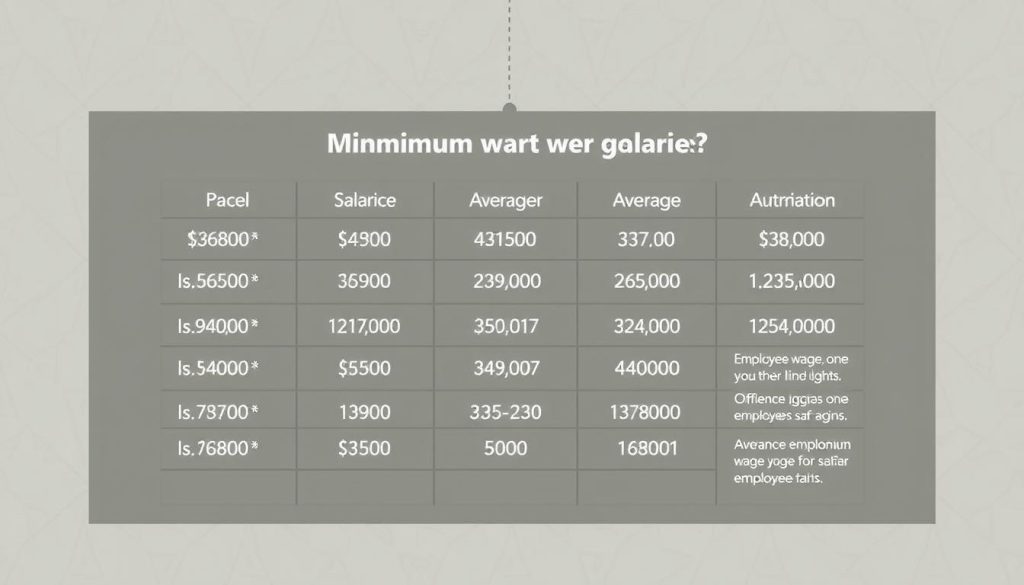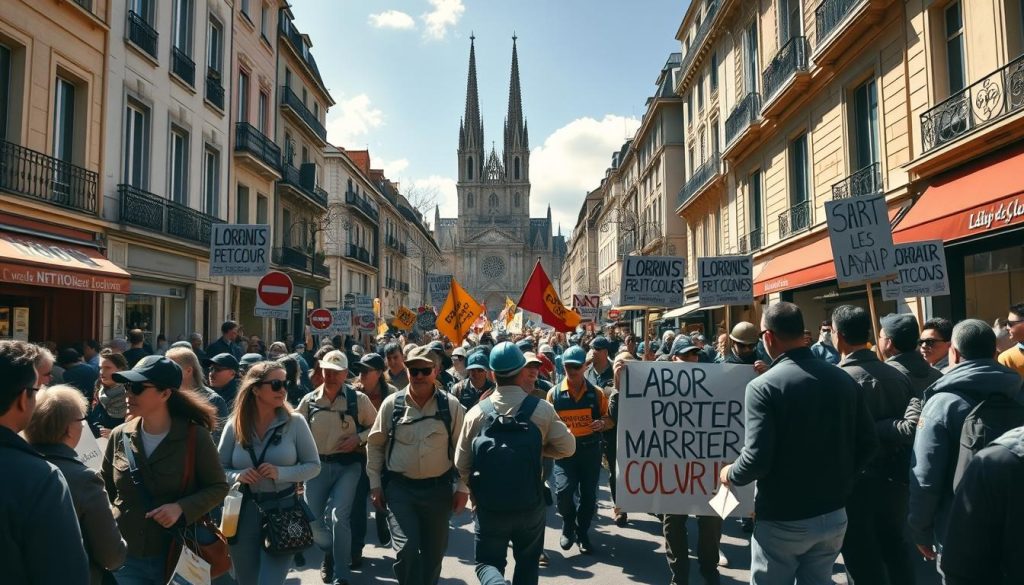In today’s fast-changing work world, knowing your rights in France is key. French labour laws give us vital protections at work. They make sure we can do our jobs safely and fairly, without being taken advantage of.
Learning about these rights helps us stand up for ourselves. It also makes our workplaces better and more productive. This article will explain the main points of employee rights in France. We’ll see how these laws help us in different work areas.
Understanding Employee Rights in France
Exploring employee rights in France is key. French labour laws have changed over time. They aim to protect workers and ensure fairness at work. Knowing the history and current laws helps us see the rights and protections for workers in France.
Overview of French Labour Laws
French labour laws create a strong system to protect workplace rights. They focus on fair treatment and equality for all. These laws cover working hours, health and safety, and fighting discrimination. Knowing these laws helps employees feel secure and valued at work.
Key Employee Rights and Protections
French labour laws give workers important rights. These include protection from discrimination, safe workplaces, and fair pay. Workers can speak up without fear, promoting their own interests. Employers must keep workplaces safe, a fundamental rule.
Employment Contracts: Types and Importance
It’s key to know the different employment contracts in France. There are two main types: fixed-term and permanent contracts. Each has its own rights and duties, important for fair work conditions.
Fixed-Term vs. Permanent Contracts
Fixed-term contracts are for specific tasks with a set end date. They’re good for short projects or seasonal jobs. Workers get similar rights to permanent contracts, like pay and holidays, but with less job security.
Permanent contracts offer long-term job security and stability. They come with more rights, like notice periods and redundancy pay. So, permanent contracts are the usual choice in France.
Key Elements of Employment Contracts
Employment contracts need clear, agreed-upon elements. These include:
- Job Description: Clearly outlining roles and responsibilities.
- Salary: Specifying base pay and any additional benefits.
- Working Hours: Detailing the expected hours of work each week.
- Duration of Contract: Mentioning whether the contract is fixed-term or permanent.
By including these key points, employers and employees can work together better. Knowing these details helps us understand employment rights in France better.

Working Hours and Overtime Regulations
In France, it’s key to know about working hours and overtime rules. The law sets a 35-hour work week as the standard. This helps us understand our rights and duties at work.
Standard Working Hours
The standard work week in France is 35 hours. This rule helps balance work and life, boosting productivity. Employers must stick to this and pay for extra hours worked.
Overtime Pay Guidelines
Overtime in France means working more than 35 hours. Workers get extra pay for these hours. The first eight hours of overtime pay 125% of the usual wage. More hours pay 150%.
| Overtime Hours | Pay Rate |
|---|---|
| 1 to 8 hours | 125% of standard rate |
| 9 hours and beyond | 150% of standard rate |
Salaries: Minimum Wage and Pay Structure
In France, knowing about the minimum wage and salary structure is key. We’ll look at the current minimum wage rates. We’ll also talk about how pay is decided in different areas. Plus, we’ll see why it’s important to be open about salaries for a fair work place.
Understanding the French Minimum Wage
The French minimum wage, or SMIC, is the starting point for salaries. As of October 2023, the hourly rate is €11.27. This rate changes every year, based on the economy and prices.
The SMIC is for all jobs, making sure workers get a fair pay for their work.
Salary Transparency Regulations
New rules on salary openness have caught everyone’s eye. Now, employers must share their pay plans to ensure fairness. This change helps fight pay gaps and supports equal pay for all, mainly in places where pay differences were big.
Being open about salaries helps build trust between workers and bosses. It makes the workplace more fair for everyone.

Employee Benefits: A Closer Look
In France, it’s key to know the difference between mandatory benefits and extra perks. This helps us see our total pay package clearly. We make sure we meet legal standards and get the most from our job.
Mandatory Employee Benefits in France
In France, some benefits are a must for employers. They help keep employees healthy and secure. These include:
- Healthcare coverage, which is key for a healthy team.
- Paid leave, so workers can rest without losing pay.
- Pensions for a safe financial future in retirement.
These benefits are a big part of what we earn. They protect our rights and well-being at work.
Additional Benefits Employers May Offer
Companies also give extra perks to keep good staff. Some of these are:
- Flexible work hours for a better life outside work.
- Training to help us grow in our careers.
- Bonuses and profit-sharing for our hard work.
It’s important to know the difference between must-haves and extra perks. Employers use these perks to draw in new staff.
Health and Safety Regulations in the Workplace
It’s important for employers and employees in France to know about health and safety laws. These laws help keep workplaces safe, protecting everyone’s health and improving work performance. Following these rules is a shared duty, helping us all work in a safe place.
Overview of Health and Safety Laws
In France, laws make employers protect workers from dangers at work. These rules cover many areas, like checking risks, training staff, and keeping equipment safe. It’s also key to check the workplace often to spot and fix any dangers.
Employer Responsibilities
Employers have big roles in keeping workplaces safe in France. Their main tasks include:
- Doing regular checks to find and fix risks.
- Teaching workers how to stay safe and giving them the tools to do so.
- Following all health rules.
- Setting up a way for workers to report any safety worries.

By doing these things, employers meet legal standards and build a safe work culture. It’s vital for everyone to talk about safety to keep the workplace healthy and safe for all.
Termination of Employment: Procedures and Rights
In France, knowing about termination rights is key. We look at the legal reasons for firing and the difference between fair and unfair dismissal. Understanding these procedures helps both workers and employers. It prepares us for job loss and explains how to end a contract.
Legal Grounds for Dismissal
Dismissal in France can be due to economic reasons, misconduct, or inability to do the job. Fair dismissals follow French laws closely. Unfair dismissals happen when the reason isn’t strong enough or doesn’t meet legal standards. Knowing these details helps protect our rights as workers.
Notice Periods and Severance Pay
Notice periods are important in ending a job, changing with service length and contract type. France has laws on the minimum notice needed. Severance pay rules add complexity, depending on how long you’ve worked and the dismissal reasons. Knowing these helps us understand our rights and duties during tough times.
Employee Representation and Unions
In France, employee representation is key to protecting workers’ rights. Trade unions act as the main voice for employees. They negotiate wages, improve working conditions, and fight for fair treatment. This way, employees can talk openly with employers, creating a better work atmosphere.
Role of Trade Unions in France
Trade unions are vital in France, linking employers and employees. They make sure workers’ voices are heard. These unions play a big part in talks about work policies, safety, and job security.
Working together with these groups boosts employee power. It helps us tackle problems and suggest improvements for better working conditions.
Rights to Collective Bargaining
In France, workers have strong rights to collective bargaining. This means trade unions can talk about salaries, benefits, and policies on behalf of their members. These talks can change pay and make employees happier and more likely to stay.
It’s important for workers to know about collective bargaining. It helps workers and employers work together, making the workplace fairer for everyone.
| Aspect | Traditional Role of Trade Unions | Collective Bargaining Rights |
|---|---|---|
| Advocacy | Represents workers in discussions with employers | Ensures employees have a say in work conditions |
| Negotiation | Negotiates contracts and agreements | Meets legal frameworks for wage negotiations |
| Support | Provides assistance during disputes | Facilitates a formal framework for addressing grievances |

Maternity and Paternity Leave Policies
In France, knowing about maternity leave and paternity rights is key for new parents. The country’s rules help both mothers and fathers take time off to care for their babies. This part explains how long you can take off, who can take it, and what rights you have during this time.
Duration of Leave and Eligibility
French laws set out how long you can take for maternity and paternity leave. This ensures you can balance work and family. Maternity leave is usually 16 weeks, but it can vary with the number of children.
Most women who are covered by French social security can take maternity leave. Fathers get 25 days for the birth of their child, which can be more in some cases. Knowing these times is important for planning.
Rights During Parental Leave
While on maternity or paternity leave, you have certain protections. You can go back to your job or a similar one with the same pay and conditions. Also, you can’t be fired for taking leave, as long as you follow the rules.
Understanding these rights makes going back to work easier. It helps parents handle their duties at home and at work confidently.
Discrimination and Harassment in the Workplace
In the workplace, it’s key for everyone to feel safe and respected. Workplace discrimination in France is a big issue that needs our focus. It’s important to know the legal protections available. Our society aims to remove bias based on race, gender, age, disability, and more.
Legal frameworks, like strong harassment policies, help fight against unfair treatment. They help keep employee dignity intact.
Legal Protections Against Discrimination
French law stops many types of workplace discrimination, making sure all employees are treated fairly. The Labour Code outlines the rights of employees. It’s vital to understand these legal protections for a fair work environment.
Employers must have policies to stop discriminatory practices. These policies help make the workplace equal for everyone.
Reporting Harassment and Abuse
Employees can report harassment without fear of getting in trouble. We should talk openly about harassment policies in our workplaces. It’s important for employees to know how to report incidents.
This usually means telling a human resources representative or following a certain process. It helps keep everyone safe and promotes respect in the workplace.
Protecting Employee Data and Privacy
In today’s workplace, knowing about employee data protection in France is key. The General Data Protection Regulation (GDPR) changes how we handle personal info. It makes sure privacy rights are respected, creating a safer work place.
Overview of GDPR Impacts
The GDPR started in 2018 and sets tough rules for data use. Companies in France must follow these rules to protect employee data. This law not only keeps personal info safe but also gives employees control over their data.
Employee Rights to Data Protection
GDPR gives employees clear rights over their personal data. They can ask to see their info, fix mistakes, and delete it in some cases. Knowing these rights is important for both employers and employees. It affects how data is handled and how they interact.
By focusing on employee data protection in France, companies can earn trust. They can also create a culture that values personal privacy.
Navigating Legal Recourses for Employees
Understanding our rights at work is key when we face challenges. In France, there are many ways for employees to address issues. Mediation is often the first step to solve problems amicably. If mediation doesn’t work, seeking legal advice is the next step to protect our rights.
Mediation and Dispute Resolution
Mediation is a great way to solve workplace conflicts without going to court. It helps both sides talk and find a solution. In France, mediation is quick and cheap, covering many issues like contract disputes or discrimination.
When to Seek Legal Advice
At times, we need to talk to lawyers. If mediation fails or if the issue is serious, legal advice is wise. Knowing when to seek help is important, like in cases of unfair dismissal or harassment. Legal advice helps us understand employment law and fight for our rights.
Conclusion: Navigating Employee Rights
Understanding employee rights in France is key to our empowerment at work. The laws can be complex, but learning about them helps us know our rights. This knowledge lets us navigate our workplace better.
Knowing our rights makes us valuable to our employers. It creates a fair and open work environment. When we speak up about our rights, we help everyone at work.
So, let’s keep learning about our rights and the labour laws in France. This way, we improve our own work lives and help make workplaces better for everyone. Empowerment and respect should be the norm in our workplaces.







